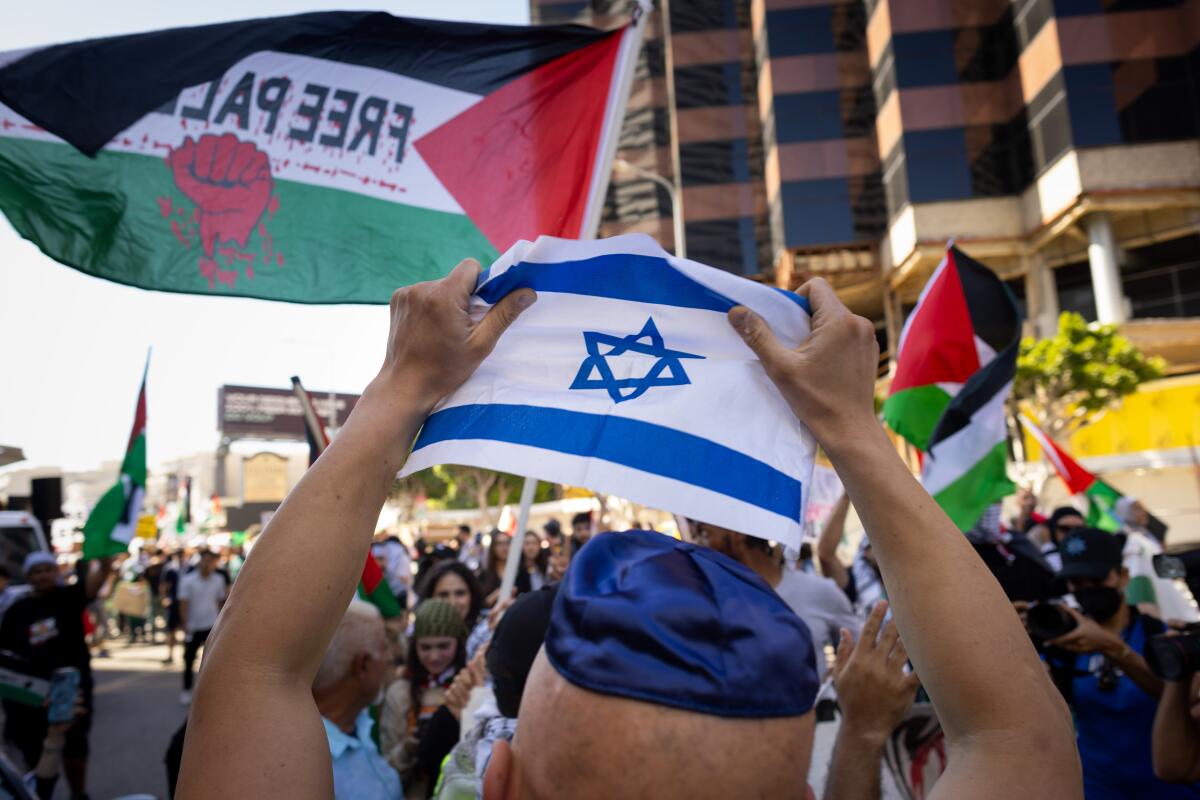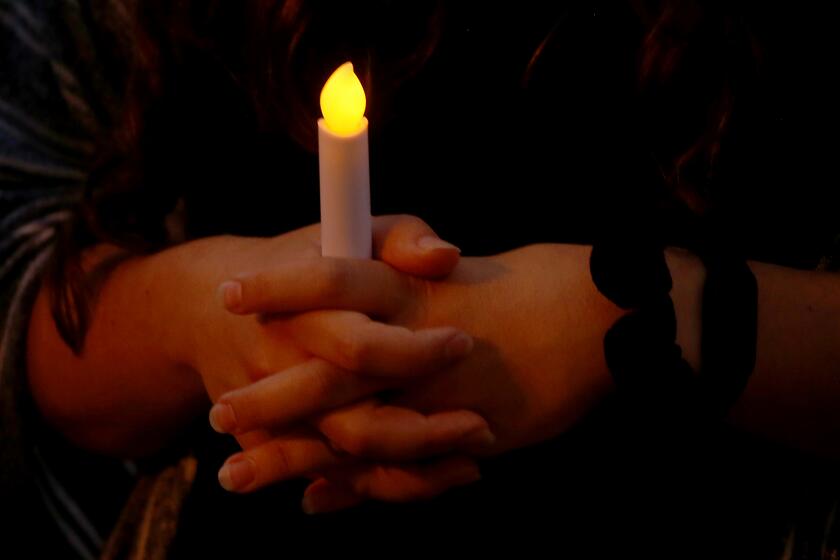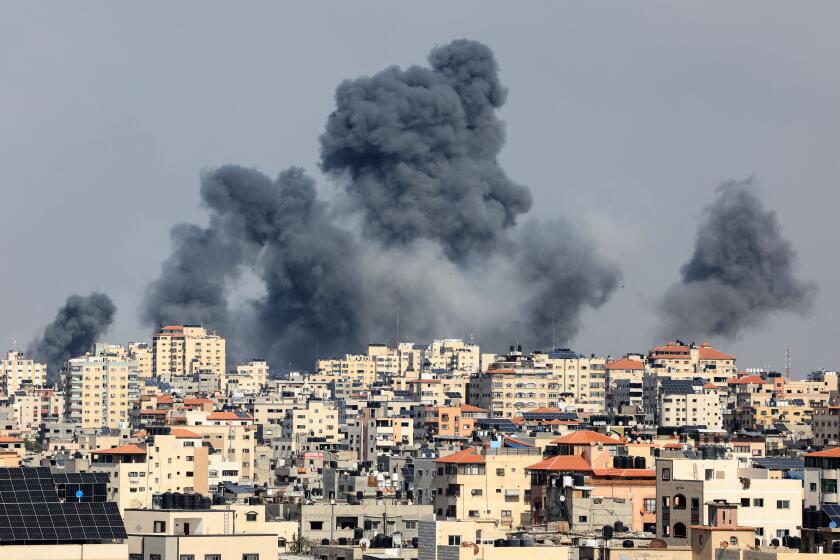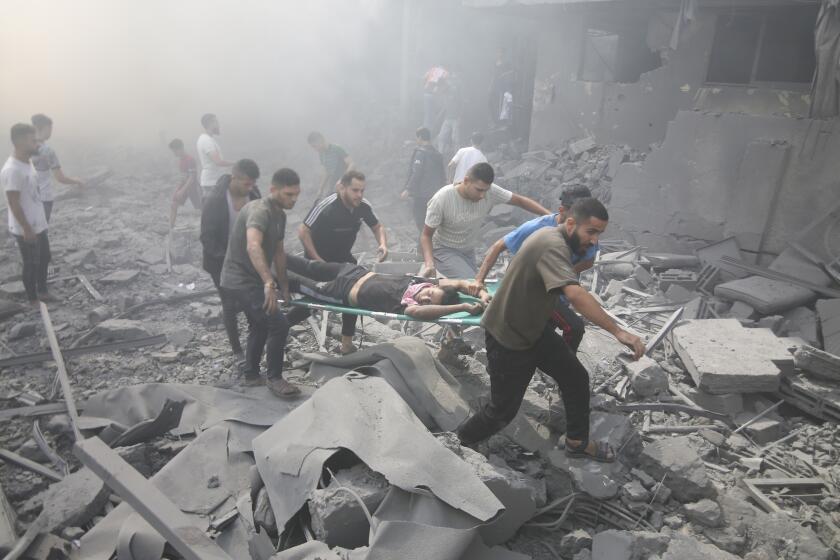Opinion: We are a Palestinian and an Israeli in Los Angeles. We find comfort and hope in mourning together

- Share via
We are two American women living in Los Angeles, spending our days working at one of the city’s oldest law schools. One of us, Rana, is Palestinian. The other, Hila, is Israeli. We are both profoundly worried about our beloved family members in the Middle East — Jewish and Arab — who are neighbors and are all currently suffering greatly as rockets keep falling and more violence looms.
Our hearts are broken by the brutal Hamas terror attack last weekend and by the prospect of additional deaths and misery in our respective communities. We want to say loud and clear that we condemn the cruel murder of kids, youths, parents and grandparents by Hamas. At the same time, we support the rights of Palestinians to live in peace and with dignity, just as every human being deserves.
In addition to the tragedy of terrorism and warfare, in the last few days we have also encountered painful misunderstandings and simplistic views of the dreadful conflict in the Middle East. Rana was blamed for spreading antisemitic ideology by classmates who failed to distinguish her genuine concern for Palestinian lives from endorsing atrocities she abhors. When she tried to educate her peers about the plight of innocent civilians on both sides and convince them that antisemitic and anti-Arab rhetoric similarly impede peace, she was unfairly accused of being an antisemite herself.
After the attack in Israel, my Facebook feed filled with funeral announcements and pleas for information. But I also see friends frame it as anti-colonial resistance.
Hila, on the other hand, faced some progressive academics who seemed to doubt, ignore or downplay the suffering of Israelis and somehow portrayed the atrocities executed by Hamas as a justified form of Palestinian resistance.
Additionally, each of us was exposed to calls for the destruction of Gaza, as if there were no children — Palestinians and kidnapped Israelis — on the other side of the border from Israel. We both refuse to imagine what that apocalypse would mean for the people we love and the entire region.
Right after the bloody Oct. 7 weekend, Hila read in an Israeli news outlet that the warning sirens and Hamas rockets had just reached Jerusalem. Remembering that Rana has relatives in the area, she immediately texted her. It was early morning, but Rana quickly texted back with good news and care: “Thank you for checking in … they are safe and hopefully it stays like that. I’m hoping your family and friends are safe …”
As Israel is poised for a ground invasion of Gaza, and bombing continues, people fear that the goal is to empty the place of Palestinians.
A few hours later, we saw each other for the first time since it all started. We hugged. It was a long hug. One of those in which you hold the other, feeling their body and heart against yours. And then came the tears. We cried about the children who came to this world for such a brief time only to be killed by hate. We wept because we were so afraid of what was to come. We are still scared.
We also experienced a brisk sense of relief. Without words, we somehow knew the other understands exactly how it feels to have your roots in this corner of the world. So we just held each other a second longer, mourning the losses.
Our hug, the words that followed it and the comfort we found in each other would not have been possible had we assumed, like many others, that all Palestinians are ready to kill Jewish Israelis or at least cheer when they die. Nor would any of that have happened if we presumed that all Jewish people are eager to harm Palestinians or seek their elimination. Those assumptions are awful and wrong. They lead to innocent people trapped by a ceaseless conflict paying with their lives.
Will reducing Gaza to rubble actually achieve long-term security for Israel? Are there no other, more effective ways to neutralize Hamas that Israel hasn’t yet tried?
Of course, our close connection does not mean we agree on all aspects of this catastrophic situation. But we feel grateful that our true care for each other has at least allowed us to unite around two things. One relates to the present: the value of mourning together all loss of innocent human life. The other relates to the future: the belief that humanity on both sides is key to breaking the vicious circle created by hate.
Do we know how to bring more peace to the area in which our families live? Not at all. Like most, we are still devastated and terrified and have no clue. But, at this horrific moment, our relationship has taught us we can start by not selectively grieving those with whom we share religion or national origin while having no sorrow when those on the other side are killed.
Fortunate to be away from the war, we found a space for our mutual belief in human lives. We then learned that just before the latest hideous events, our Israeli and Palestinian sisters had the courage and vision to hold a joint gathering in Jerusalem to demonstrate and affirm their commitment to a nonviolent resolution. Had we been there, we would have probably joined, and we want to encourage others to search together for more ways to embrace and protect the fragile wish for better days.
In fact, even as the recent tragedy has pushed some to take extreme positions and make regrettable statements, many organizations remained united and committed to working together to prevent escalation and continue their tireless search for common ground. For example, the Alliance for Middle East Peace, a coalition of over 170 organizations and tens of thousands of Palestinians and Israelis, stated: “ALLMEP stands in solidarity with our members across the region: the brave Israelis and Palestinians who refuse to be enemies, and who are working to shape a reality where events such as those witnessed over the past few days become unimaginable. Our members are speaking loudly and clearly about the values that unite our community: Opposition to this horrific violence, and a commitment to Israeli/Palestinian partnership on the path to ending it, and achieving peace and equality.”
So even at this dark time, we dare to hope that we are not alone and many people still believe in collective humanity and, instead of alienating one another, will work to help bring some light. If we are wrong, those fueled by hate have already won.
Rana Shalhoub is a third-year law student, a teaching assistant and a board member of the International Law Society at Southwestern Law School, Los Angeles. Hila Keren is the associate dean for research and a professor of law at Southwestern Law School, Los Angeles.
More to Read
A cure for the common opinion
Get thought-provoking perspectives with our weekly newsletter.
You may occasionally receive promotional content from the Los Angeles Times.













